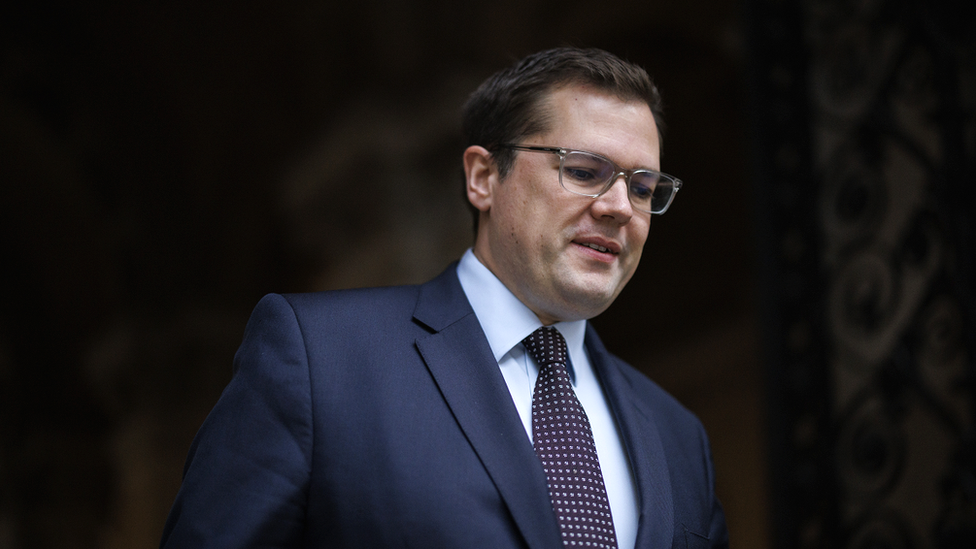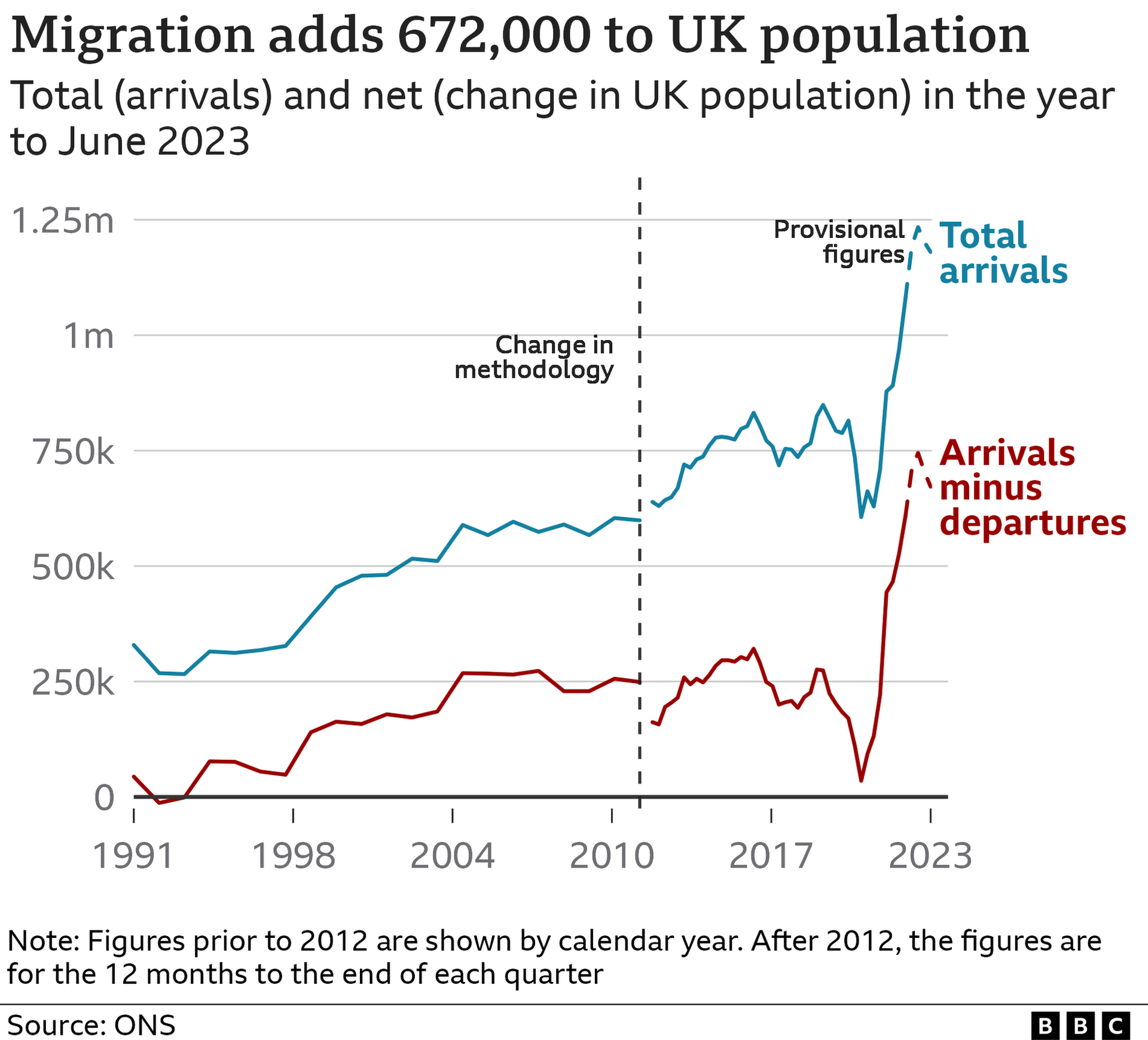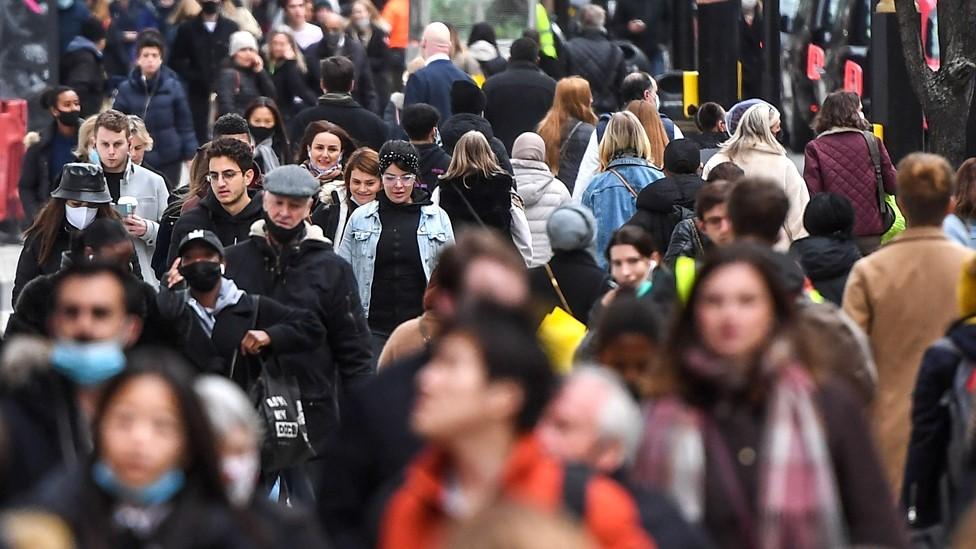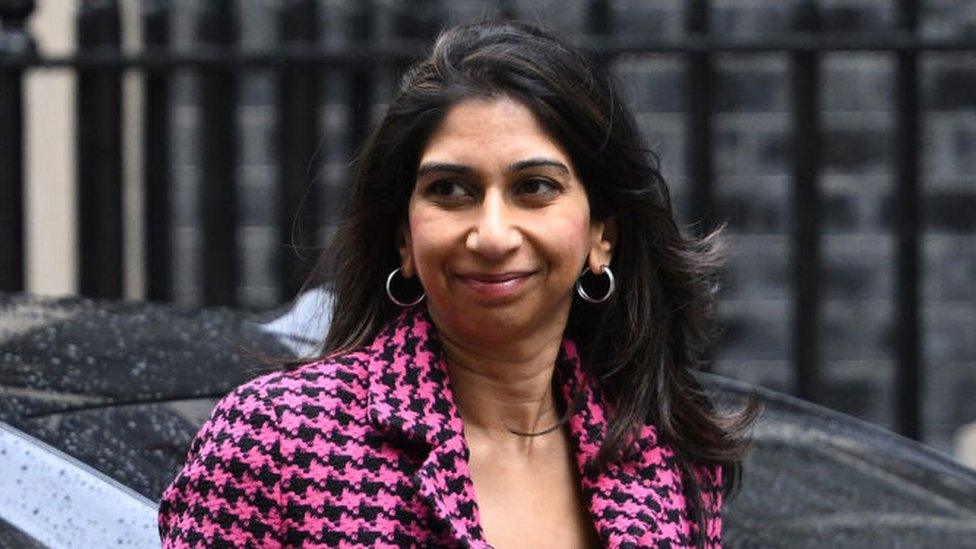Robert Jenrick pressures No 10 with own plan to cut migration
- Published

Immigration Minister Robert Jenrick has drawn up a set of proposals to attempt to cut immigration to the UK.
The ideas, which he has shared with No 10, are not yet government policy, but are being discussed internally.
Among the suggestions are a required minimum annual salary of £35,000 in order to receive a work visa.
It comes after official figures put last year's net migration figure higher than previously thought - at a record 745,000 people.
This has led to calls for more action to bring down migration from Tory MPs.
Rishi Sunak said "levels of immigration are too high" and need to come down "to sustainable levels".
The prime minister added that the government's plans to clamp down on dependents of students arriving in the UK is "the single toughest measure that anyone has taken to bring down the levels of legal migration in a very long time".
Work and Pensions Secretary Mel Stride told BBC Radio 4's Today programme that, since Brexit, the UK government has full "control of the level of migration into the country".
"And it's up to us how we use that," he said.
Mr Stride said this week's Autumn Statement would also help reduce migration by getting more UK citizens "into the labour market".
The UK needs "some level of migration" to make up for skills shortages in the economy, he said. But these gaps could be filled by reintegrating long-term unemployed back into the labour market as part of a £2.5bn overhaul of the benefits system.
Given the size of the net migration numbers, it is understood Mr Jenrick believes the government has to consider radical policy changes if the figures are, eventually, to fall.
He has suggested stopping those working in health and social care from bringing dependents with them to the UK.
Another idea is to put a cap on visas for people working in social care.
But this would probably meet resistance from the Department of Health. There has been an increase in workers arriving with visas to fill chronic staff shortages in the NHS and social care, the Office for National Statistics says.
Mr Jenrick has also suggested scrapping what is known as the Shortage Occupation List, external, which highlights jobs that employers are struggling to fill.
The Migration Advisory Committee - an independent body that advises the government, external on migration issues - recommended the abolition of the list earlier this month.
Despite repeated questions, the prime ministers official spokesman refused to address Mr Jenrick's proposals. Instead Downing Street has insisted the government's current plans would have a "significant impact" on migration figures.

Migration has been a continuing theme to the Conservatives' 13 years in office, since 2010.
When the now Foreign Secretary Lord Cameron was prime minister, he promised to cut net migration to the tens of thousands.
It is a pledge that has never come close to being met and became a motivating factor for some to back Brexit.
Speaking at a fringe event at the Conservative conference this October, Mr Jenrick said: "Where I think we have gone wrong, immediately after leaving the EU we established a legal migration system that was, if anything, even more liberal than the system we had when we were in the EU."
He added that the government had been "quite naive about the consequences in terms of numbers".
'Do or die'
Mr Sunak is coming under pressure from within his party to reduce migration numbers.
Earlier, former Home Secretary Suella Braverman - who worked alongside Mr Jenrick until she was sacked 10 days ago - criticised the government's record on immigration and said the figures were a "slap in the face to the British public who have voted to control and reduce migration at every opportunity".
Setting out her own ideas for reducing immigration, Mrs Braverman has called for an annual cap on net migration and the raising of the salary threshold outside health and social care to £45,000 a year.
It is understood Mrs Braverman and Mr Jenrick had jointly submitted ideas to No 10 when she was home secretary.
Following her sacking, Mr Jenrick has since gone back to Downing Street, with a similar but pared-down set of ideas he hopes Prime Minister Rishi Sunak might accept.
Downing Street is yet to comment on the proposals.
Other Tory MPs have also called for more action to bring down migration.
The New Conservatives group, on the Tory right, has described the issue as "do or die" for the party.
Writing in his Daily Mail column,, external former Conservative Prime Minister Boris Johnson said the minimum income for most migrant workers should be increased to at least £40,000.
Labour leader Sir Keir Starmer said "shockingly high" net migration represented "a failure not just of immigration, but also of asylum and of the economy".
Provisional figures to June of this year suggest the rate of net migration - the difference between the number of people coming to live in the UK and those leaving - may now be slowing.
The vast majority arriving were from countries outside the European Union, with students accounting for the largest group of non-EU migrants - also true of last year.

Sign up for our morning newsletter and get BBC News in your inbox.

- Published23 November 2023

- Published23 November 2023
